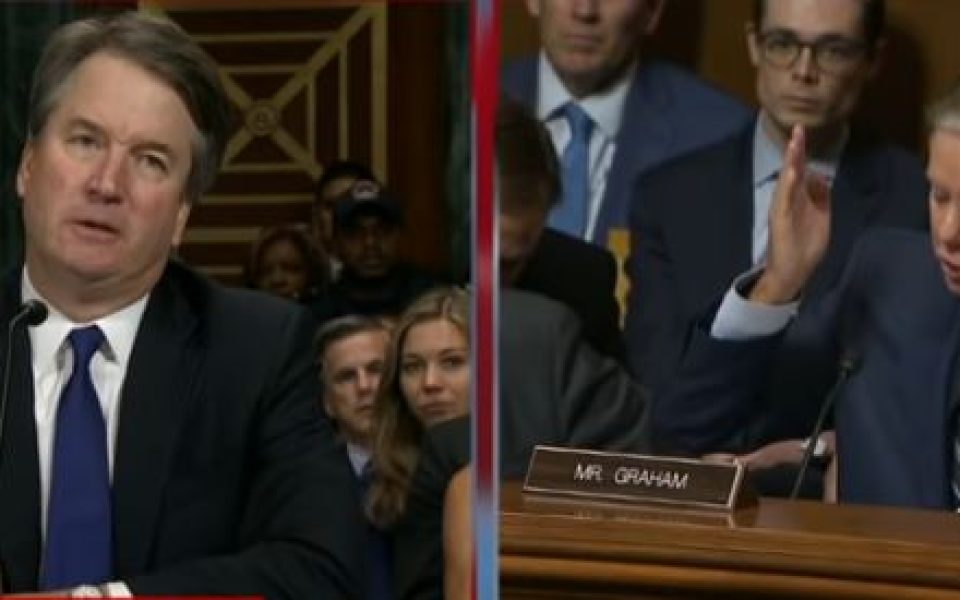Black robe and swill/ I believe Anita Hill/ The judge will rot in hell/ It’s the song I hate/ It’s the song I hate
— “Youth Against Fascism,” Sonic Youth (1992)
The world of Georgetown Prep bro parties in the summer of ’82 and Sixteen Candles two years later crystallize a cultural moment at the advent of the Reagan Revolution, whose conservative ascension would form the glide-path for Brett Kavanaugh’s rise through the Clinton impeachment, a post in the George W. Bush White House and the eventual nod from Donald Trump, the impresario of ’80s male entitlement and materialism.
By 1992, American culture felt like a hangover from the go-go Reagan era. The summer of ’92 marked the breakout for Sonic Youth, and one line in particular from their song “Youth Against Fascism” captures that moment and also echoes in clang-y reverb almost three decades hence: “I believe Anita Hill; the judge will rot in hell.”
Sung with righteous certainty, of course a portion of the song’s ironic power came from the fact that the bipartisan Senate Judiciary Committee didn’t believe Anita Hill, and approved Clarence Thomas for confirmation to the Supreme Court.
Sexual harassment, misogyny and rape culture remained intact in 1991 when Thomas was seated on the high court, and in 2018 it is challenged — though by no means dislodged — by #MeToo. And while the furious pathos of the Kavanaugh nomination seems to have caught the nation off guard, it’s both a predictable outcome of the decades-long culture wars and the election of the playboy bully who now occupies the White House.
The spectacle on display in the Judiciary hearing room on Sept. 28 was a Rorschach test, with the riveting testimony of Christine Blasey Ford and Judge Kavanaugh hardly more likely to sway the voters who make up the polarized American electorate than the stacked 11-10 membership of the committee. One America saw a shaken woman who has lived through intermittent hell for the past 36 years and endured death threats in recent weeks credibly allege a shattering incident of sexual assault. And they saw a group of all-male, all-white Republican lawmakers ready to cast Blasey Ford’s courage and pain to the side to fulfill a partisan objective of locking down a conservative majority on the high court.
Another America saw something else: The nomination of a highly qualified jurist and a man of good character and integrity jeopardized by a mere allegation of misconduct dating back to his high school years, uncorroborated by any evidence other than the accuser’s testimony. They saw a Democratic caucus willing to tear down a good man and shame his family for the nakedly partisan purpose of preventing a duly elected president from placing his nominee on the court.
A cynic might question might question the sincerity of committee members on either side of the aisle, noting for instance that Sen. Cory Booker (D-NJ) is likely positioning himself for a run for president in 2020. But his words, no doubt, rang true for a major segment of the American electorate.
“You are opening up to open air, hurt and pain that goes on across this country,” Booker told Blasey Ford. “And for that, the word I would use, it’s nothing short of heroic. Because what you’re doing for our nation right now besides giving testimony germane to one of the most sacred obligations of our office, is you are speaking truth that this country needs to understand. And how we deal with survivors who come forward right now is unacceptable. And the way we deal with this unfortunately allows for the continued darkness of this culture to exist. And your brilliance shining light on this, speaking your truth, is nothing short of heroic.”
Similarly, it’s no stretch to assume that the tirade by Sen. Lindsey Graham (R-SC) was an audition for a soon-to-be-vacant position as attorney general.
“You’re looking for a fair process?” Graham asked Kavanaugh. “You came to the wrong town at the wrong time, my friend…. Would you say you’ve been through hell?… This is not a job interview. This is hell. This is going to destroy the ability of good people to come forward because of this crap.”
Interspersed with Graham’s outraged solidarity with Kavanaugh were barbed denunciations of his Democratic colleagues.
“Boy, y’all want power,” he said. “I hope you never get it.”
Implicit in much of the commentary by committee members on both sides of the aisle – and readily accepted by their respective constituencies – is that the other side has become so debauched by lust for power that they’re willing to set aside any principle.
Maybe there’s something more structural and fundamental behind the deepening crisis, and the culture wars are only the most recent manifestation. But even the insiders seemed to recognize a point of no return in last week’s hearing, and in Graham’s performance in particular.
“It wasn’t just Kavanaugh who embraced the kind of Trumpist style of politics,” Mara Liasson, NPR’s national political correspondent, reflected on “Weekend Edition Sunday.” “It was also the Republicans on the committee led by Lindsey Graham, turning everything into a partisan bloodbath. That really is the heart of Trumpist-style politics, where you do this even at the risk of damaging democratic institutions. And I think that if we are in an ongoing kind of stress test of our democratic institutions, Thursday was a day when those institutions really seemed to buckle under the stress.”
Join the First Amendment Society, a membership that goes directly to funding TCB‘s newsroom.
We believe that reporting can save the world.
The TCB First Amendment Society recognizes the vital role of a free, unfettered press with a bundling of local experiences designed to build community, and unique engagements with our newsroom that will help you understand, and shape, local journalism’s critical role in uplifting the people in our cities.
All revenue goes directly into the newsroom as reporters’ salaries and freelance commissions.


Leave a Reply